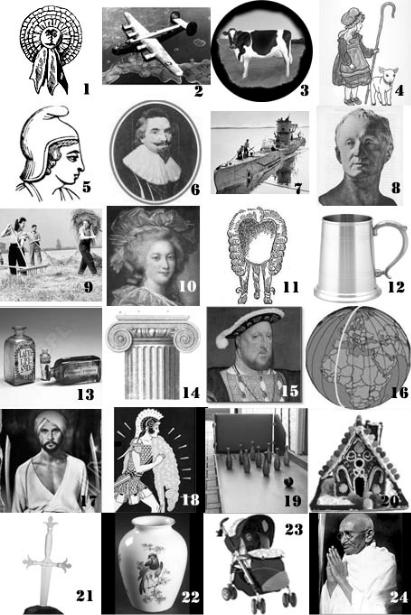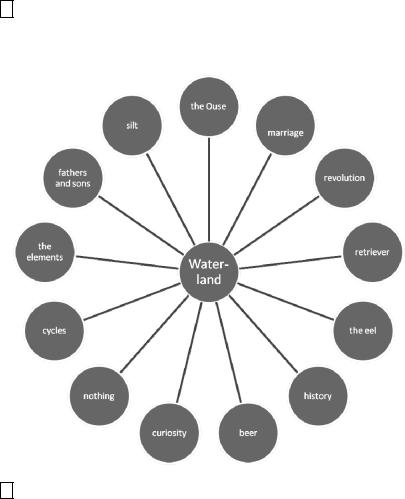
voskresenskaya_e_g_i_dr_sost_sovremennye_angliiskie_romany
.pdf
тесь приобрести путевку, иначе кто-то более расторопный может вас опередить. 6. Оглушительный рев свидетельствовал о про- буждении зверя от зимней спячки.
Comprehension and Discussion
5 Answer the questions below.
1)What is the significance of the two aircraftmen? What role do they play?
2)‘This smell of silt is the smell of sanctuary, is the smell of amnesia. He’s here. He’s now. Not there or then. No past, no future.’ Why is this important to the novel as a whole?
Language and Style
6Translate the following passage into Russian.
“But we all saw… – And is gone.” (p. 357)
EXTENSION ACTIVITIES
7 Discuss the following questions.
1)Did you expect such ending?
2)Do you find such ending credible? Is it logical? Why or why not?
8Look through chapter 26 and all you have read about Dick. Find as many matches between Dick and eels as you can.
331

REVISION AND CONSOLIDATION
TEST YOUR VOCABULARY
1 Test yourself. How many of these 100 words can you remember?
быть мастером, уметь что-то делать; постоянно преследующий; разумное объяснение; логическое обоснование; двусмысленный, неопределённый; отшельник, пустынник; неизбежный, неми- нуемый; похвальный, достойный похвалы; последствия; побуж- дать, подстрекать, стимулировать; доказывать ложность; загад- ка, головоломка; выдумка, фальсификация; театральное пред- ставление, наигранность, театральность; подтверждать, одоб- рять; безбрачие; связь; вершина, кульминация; постоянные ра- ботники, помощники; снисхождение; воплощение; предатель- ский; соблазнительно, дразняще; почитание, почтение, уваже- ние; трепач; разглашать, раскрывать; затруднительное положе- ние; бессвязный, несистематический; восторг, искренность, от- кровенность; взвалить на плечи; рвение, старание; причудли- вость, нереальность; целесообразный, выгодный; хитрость, уловка, увертка; проницательность, сообразительность, хватка; третья сторона; вести войну; выскочка; внешнее приличие, бла- гопристойность; по настоянию; неприязнь, враждебность; оск- вернять, пятнать; мешать, препятствовать; освящённый веками, почтенный; панацея; невнимательность, халатность; окрестно- сти, соседство; порок; бесполезный, напрасный, тщетный; им- провизированный; по собственной воле; лелеять; старый, дрях- лый; важнейший, главный; личные вещи, личные принадлеж- ности; неистовствовать; печально известный; вездесущий; на- следство; искусность, ловкость; живучий человек, консерватор; дословно, слово в слово; объявлять, уведомлять; мученик; осуще- ствимость, выполнимость; задаток; принимать (должность); драчливость, воинственность; выражать неодобрение, освисты- вать; навязать, свалить на кого-то; мизерный, крошечный; пре- тендент; непорочное зачатие; обличительная речь; как по ко- манде; испортиться; простой народ; проклятие, заклятие; мни- мый, предполагаемый; в общем и целом; подавать прошение; раздавать, расточать; неподвижно, как столб; след, остаток; не-
332

проницаемый; обвинительный, обличительный; поспешный, скорый; безмятежный; бубнить; здравомыслящий, благоразум- ный, умерить аппетит, стать жертвой, умереть от; неподражае- мый; важный, имеющий большое значение; сознаться (в дурном поступке, преступлении); устно, на словах; дань, должное; успо- каивать, подавлять; превосходство, преимущество; напоказ; для виду, нарочито
100–90 words – Excellent! The result of your hard work is evident.
89–75 words – Well done. Remember: the sky is the limit.
74–60 words – You’ve got quite decent memory, why not train it more?
59–0 words – It is usually better if you look up a dictionary during the term.
2 In pairs test each other if you can explain the meaning of these idioms and set-phrases.
elders and betters, to be under a sway, by trial and error, prick up one’s ears, a tall order, to tread on the heels, spit and polish, to put matters right, to hold one’s grounds, not to let the cat out of bag, it dawned on sb, to be second to none, to go on the rampage, over the hill, maiden speech, nineteen to the dozen, patron saint, to beat about the bush, to butter sb up, to make do, a thorn in the flesh, under the auspices of smth, lifetime’s passion, split second, to feed one’s hunger for smth, sorrows seldom come singly, to meet halfway, to and fro, to chase our own tails, hither and thither, On High, to kingdom come, Jeremiahical humour
3 Can you name what you see in the pictures?
333

334

THEMES AND IDEAS
4Consider the significance of the following words within the novel. They may be important as indicators of key themes, as pointers to important aspects of the plot, or as central metaphors in the narrative.
5Consider the following ways in which the setting of Waterland contributes to the novel, and find illustrative references from within the novel where these are not provided.
•Note the significance of the title. It can be taken in both literal and metaphorical sense, the compound noun reflecting the shifting, insecure mood that characterises the novel.
335
•The title’s balancing of the two elements is reflected in differences between the two main families in the novel. ‘And that is another difference between the Cricks and the Atkinsons. That whereas the Cricks emerged from water, the Atkinsons emerged from beer. The beer, of course, derives from barley grown on the Atkinsons’ land.
•Like the setting, the Cricks life is amphibious, silty, fen-like, phlegmatic.
•We are told that the flat fenlands are an oddly appropriate setting for sexual activity.
•The flat, unvarying setting, with its doses of reality can seem bleak and oppressive, leading to melancholy and madness.
•From another perspective, the fens are a magical, mythical place.
•Water plays a complex part within the narrative. Rivers carry clues; significant events occur in or because of the water: floods, swimming, drownings.
•Rivers and water are also used metaphorically, as important symbols. Children (chapter 12), history (chapter 14) and incest (chapter 30) are all represented in this way.
•The process of story-telling itself as having a watery, river-like quality. Note the structure of the novel in this respect.
•The range of narrative styles and genres within Waterland in some ways are generated through the strongly established sense of the reality of place. Text book history and geography, legend and biography are all thus facilitated.
•From one perspective the novel presents the history of brewing. In the isolated fenland setting, Swift is able to convey an image of the 19th century industrial and capitalist expansion: a family history charted by the fens.
•The fens are built on reclaimed land and the silting process. This image reflects the circular, evolutionary nature of the historical process.
•Although significantly local and very much a place with its own, unique qualities, the fens also provide interesting and significant parallels with other places and other times, e.g. the fields of Flanders.
336

6Write a character sketch of the following characters using Character Sketch Template in Reference Section.
•Tom Crick
•Mary Crick (Metcalf)
•Dick Crick
•Scott Lewis
•Price
•Ernest Atkinson
•Henry Crick
•Helen Crick (Atkinson)
7Draw the timeline of the events of the novel, including both History and his and her story.
8Answer the questions below.
1.Why are the past and the present, history and fairy-tale, biology and French Revolution mixed? What impression does it produce? Is this a lecture?
2.What the role of superstitions in the novel? Which superstitions can explain some of the events in the novel? Where and when are they mentioned? What is their significance for the novel? What effect do they create?
3.What is History for the narrator? Why does he start telling the story of the Fens and his family in the middle of the term? Why is History important? How did it influence Crick’s life?
4.Why does the author tell about the French Revolution? How does it intervene into the novel? Who is revolutionary in the novel? Support your ideas with examples.
5.What is the role of eels? In which episodes are they mentioned? Why do you think the author wrote a whole chapter about eels? Who can be compared with the eels? Why? What do they symbolize?
9 Play Paperchase Dominoes.
1)Copy one set of dominoes for a group of 3–6 players and cut them along the bold lines.
2)Find the grey tile and put it on the table. It starts the game.
3)Deal 3 dominoes to each player. The remainder of the dominoes makes up the stock.
337

4)Draw lots to decide the player who starts the game. Play proceeds to the left (clockwise).
5)Each domino has a question and an answer. A player adds their domino to the layout if it has the answer/question to the question/answer of one on the table.
6)If a player is unable to make a move, (s)he must draw dominoes from the stock until (s)he can make a move. If there are no dominoes left, then the player must pass.
7)A game ends either when a player plays all their tiles, or (optionally) when all the tiles are placed on the table.
|
What is a |
|
According to |
What is |
How is Tom’s |
|
‘knack’ that |
|
Price, what |
important |
fenland home |
|
ran in Tom’s |
|
matters? |
about silt? |
described? |
|
family? |
|
|
|
|
|
|
|
|
|
|
|
‘… for the |
|
‘A fairy tale |
|
|
|
building of |
|
Children |
Telling stories |
|
|
|
land’ |
|||
|
Empires.’ |
|
|
|
|
|
|
|
|
|
|
|
|
|
|
|
|
|
|
|
The Cricks |
What does ‘a |
‘Evil isn’t |
|
Who will |
something |
|||
|
told stories. |
live fish |
|||
|
inherit the |
that happens |
|||
|
What did the |
in a woman’s |
|||
|
Earth? |
far off. It …’ |
|||
|
Atkinsons do? |
lap’ do? |
|||
|
|
|
What? |
||
|
|
|
|
|
|
|
‘The Here and |
It is able to |
|
He couldn’t |
|
|
create and to |
|
|||
|
Now – and the |
Made history |
|||
|
destroy |
swim |
|||
|
future’ |
|
|||
|
simultaneously |
|
|
||
|
|
|
|
|
|
|
|
|
|
|
|
338

Why are |
|
|
|
|
precise |
What is put |
Who wins |
|
|
accounts of |
in Mary’s |
the swimming |
Dick is … |
|
the day hard |
knickers? |
competition? |
|
|
to come by? |
|
|
|
|
Coronation |
Explanations |
Freddy Parr |
The Sargasso |
|
Ale |
Sea |
|||
|
|
|||
|
|
|
|
|
What fact |
The ale |
|
|
|
about Freddy |
What doesn’t |
|
||
brewed in 1911 |
Who by? |
|||
Parr was well |
Price want? |
|||
is called … |
|
|||
known? |
|
|
||
|
|
|
||
Make her |
‘Suddenly |
Everyone was |
|
|
touches your |
‘hopelessly |
An eel |
||
barren |
||||
arm’ |
drunk’ |
|
||
|
|
|||
|
|
|
|
|
Where do eels |
Who is the |
|
What |
|
|
‘distinguishes |
|||
‘savior of the |
Historia is … |
|||
spawn? |
us from the |
|||
world’? |
|
|||
|
|
animals’? |
||
|
|
|
||
Dick Crick |
‘a potato head’ |
Helen and |
Thomas |
|
Ernest’s child |
Atkinson |
|||
|
|
|||
|
|
|
|
339

Where does |
What is |
Martha Clay |
God is for |
|
the baby |
a History |
|||
is … |
whom? |
|||
come from? |
teacher? |
|||
|
|
|||
|
|
‘The opposition |
‘He ponders |
|
‘… it’s all |
|
contingencies, |
||
God |
of teacher |
|||
right’ |
he’s no good |
|||
|
and student’ |
|||
|
|
at action’ |
||
|
|
|
||
|
|
|
|
|
Who made |
‘As long |
Where does |
What is |
|
the Leem |
as there’s |
Mary say the |
education |
|
navigable? |
story …’ |
baby is from? |
about? |
|
Either fact |
Curiosity |
Safeways in |
‘Someone |
|
who teaches |
||||
or fiction |
Lewingsham |
|||
|
mistakes’ |
|||
|
|
|
||
|
|
|
|
|
What is ‘the |
‘You shouldn’t |
|
|
|
go mistaking |
|
|
||
historian’s |
the reclama- |
|
|
|
besetting sin’? |
tion of land |
|
|
|
|
…’ |
|
|
|
‘some said … |
‘simple, |
|
|
|
backwards |
|
|
||
a witch’ |
|
|
||
folk in god- |
|
|
||
|
|
|
||
|
forsaken |
|
|
|
|
places’ |
|
|
|
|
|
|
|
10Write a one-page review of Waterland. Include in it some facts about the novel and its author and what people can like and dislike about the novel as well as your personal recommendation.
340
